Data Warehouse Engineer Resume Examples

Jul 18, 2024
|
12 min read
Building your career’s foundation brick by brick: Your complete guide to crafting a standout data warehouse engineer resume to catch an employer’s eye and land your dream job.
Rated by 348 people
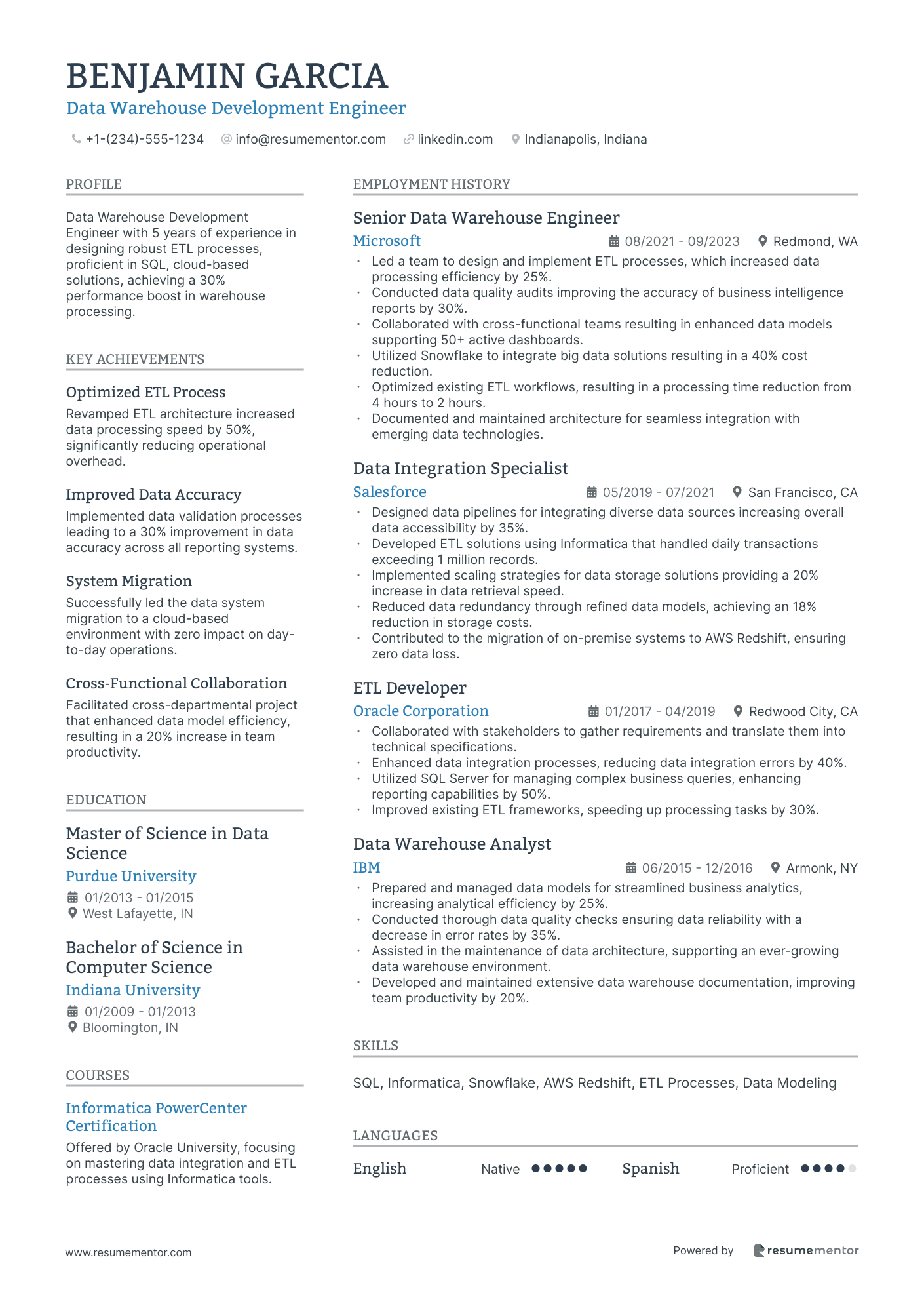
Data Warehouse Development Engineer
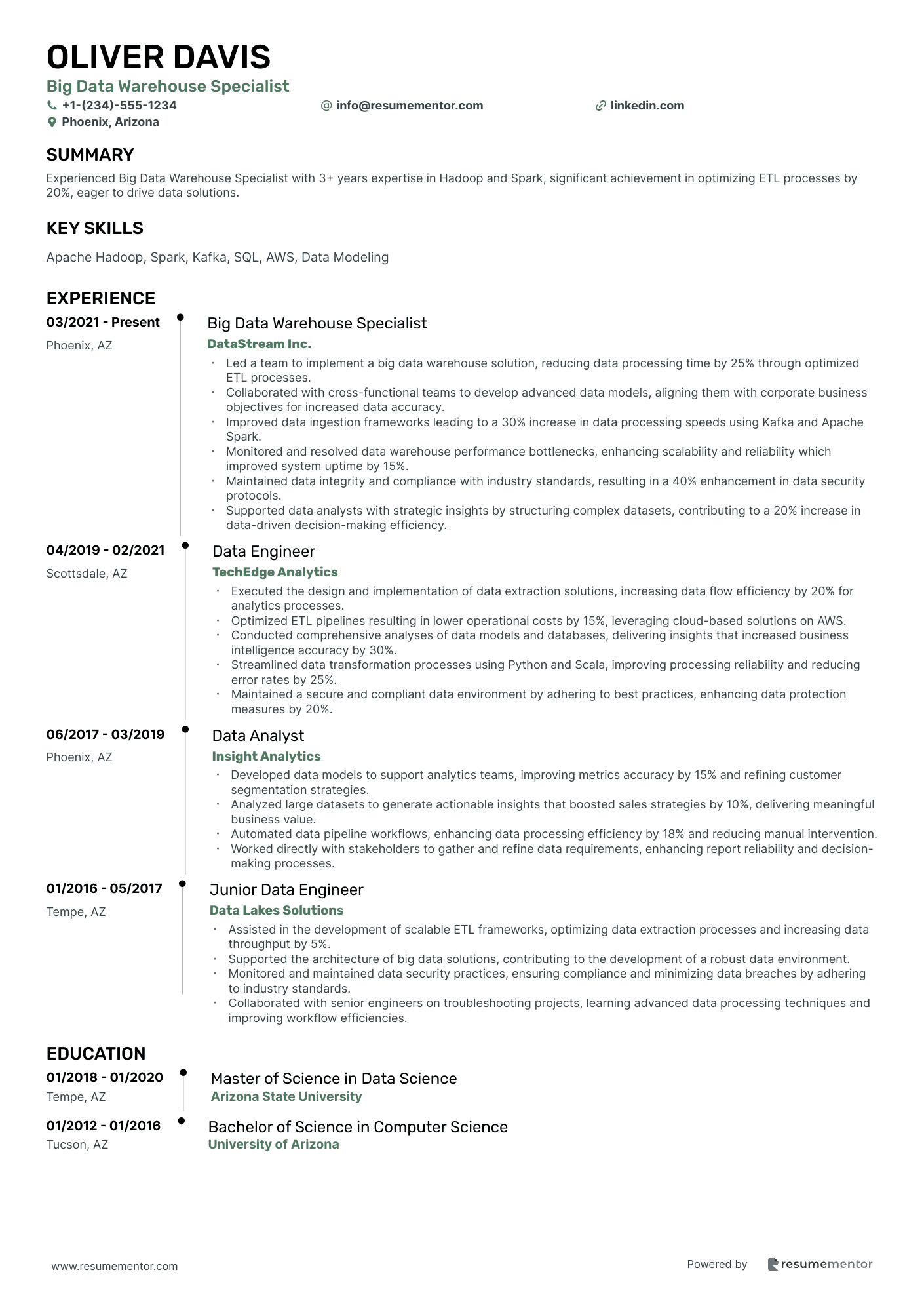
Big Data Warehouse Specialist
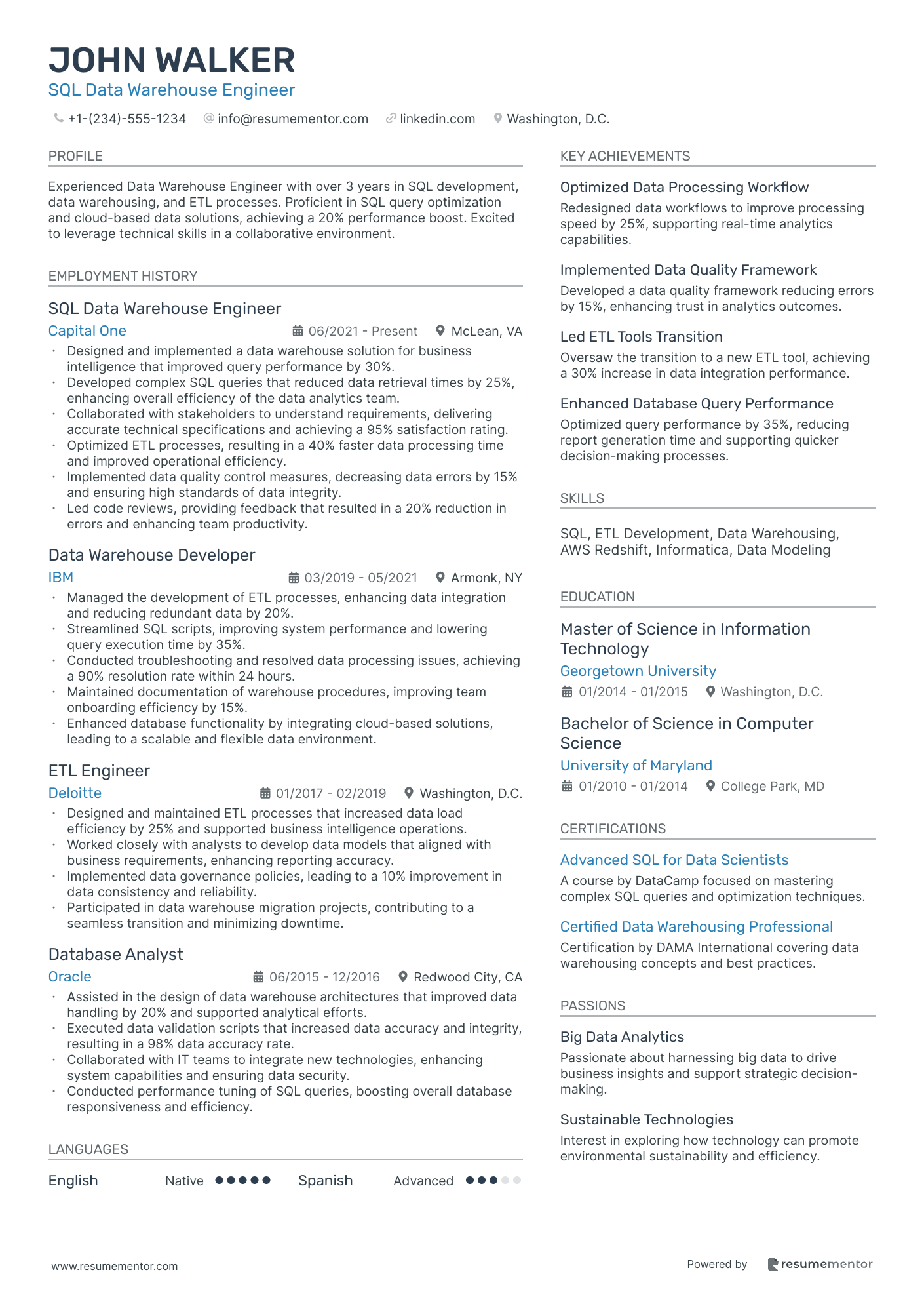
SQL Data Warehouse Engineer
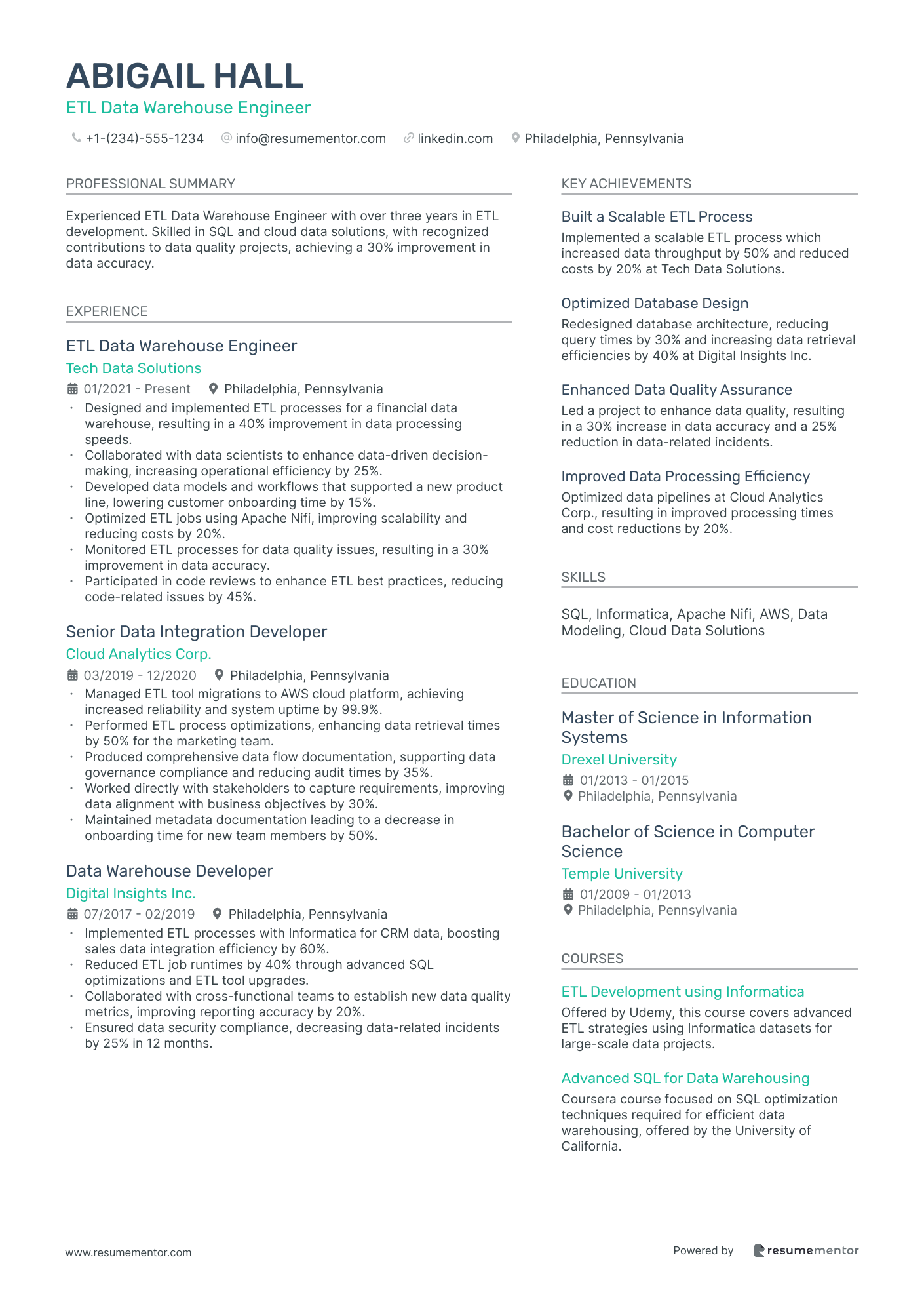
ETL Data Warehouse Engineer
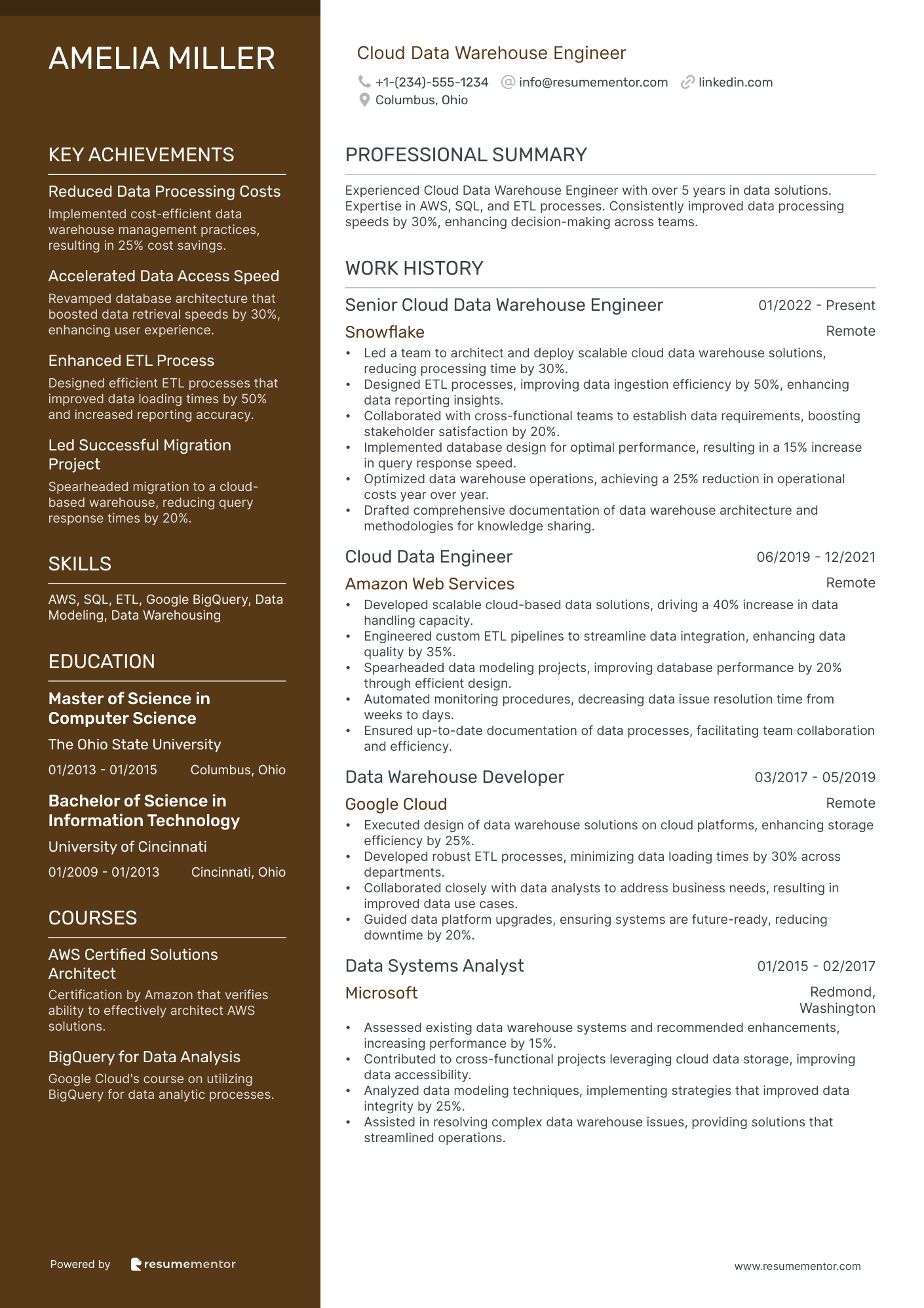
Cloud Data Warehouse Engineer
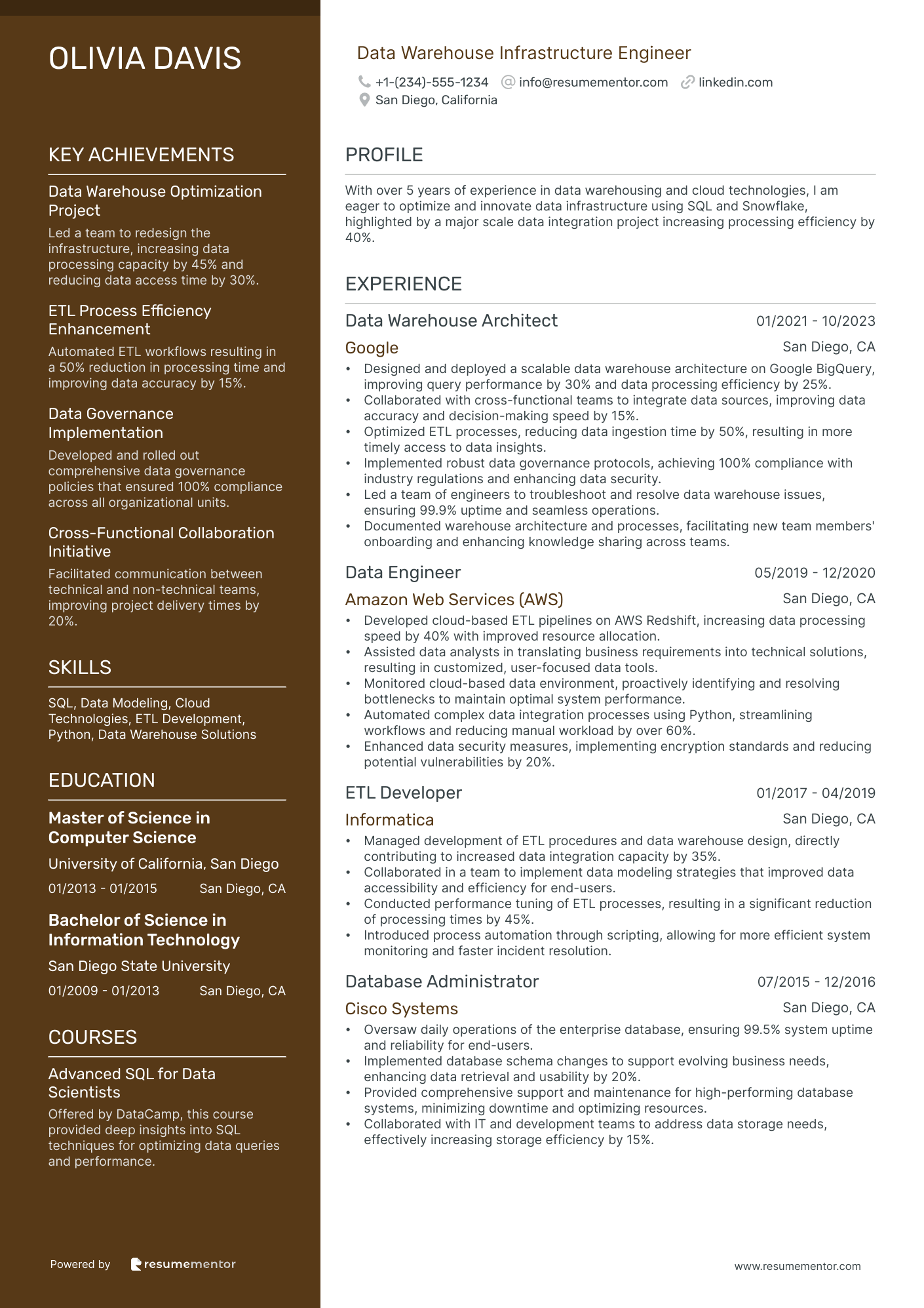
Data Warehouse Infrastructure Engineer
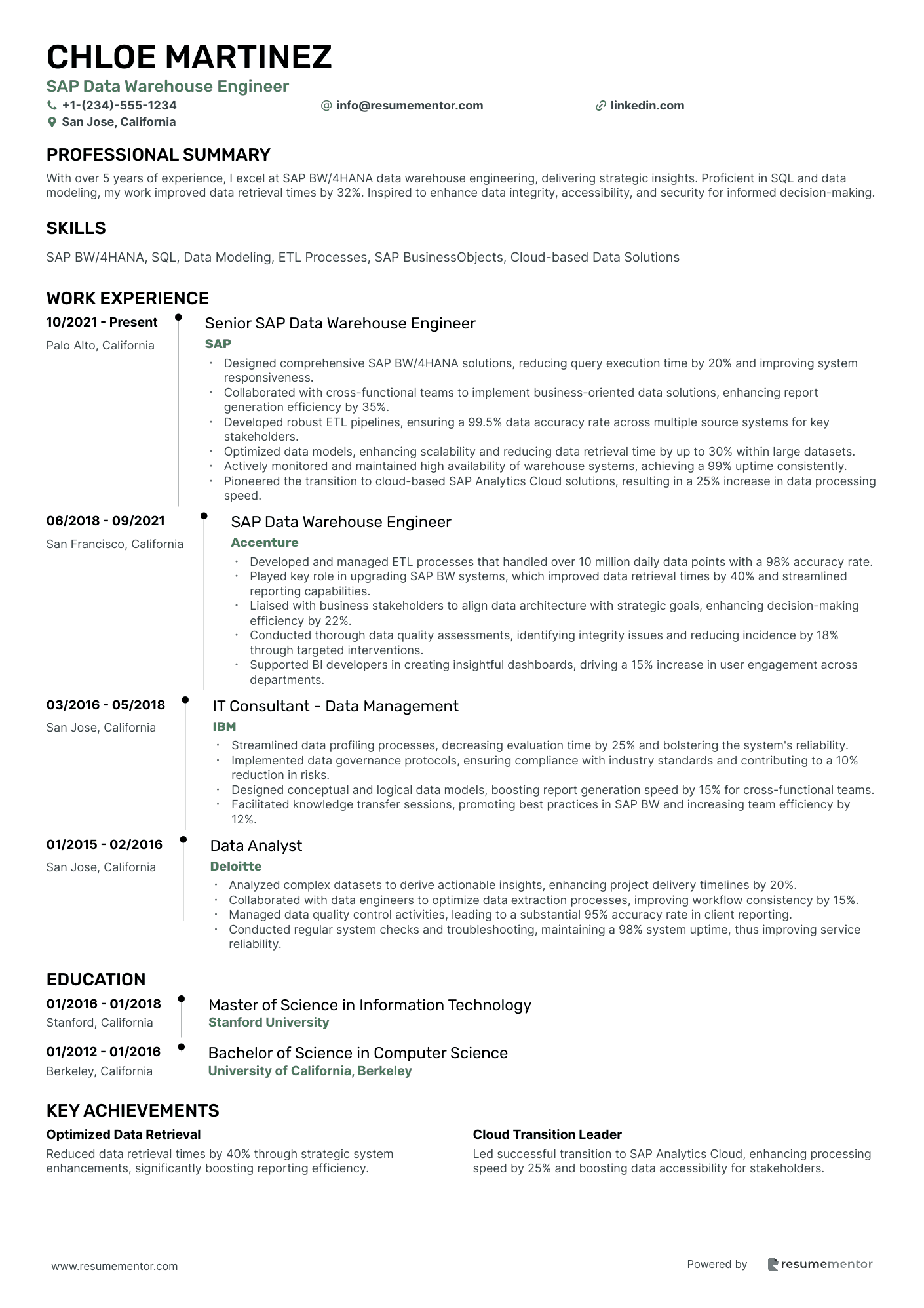
SAP Data Warehouse Engineer
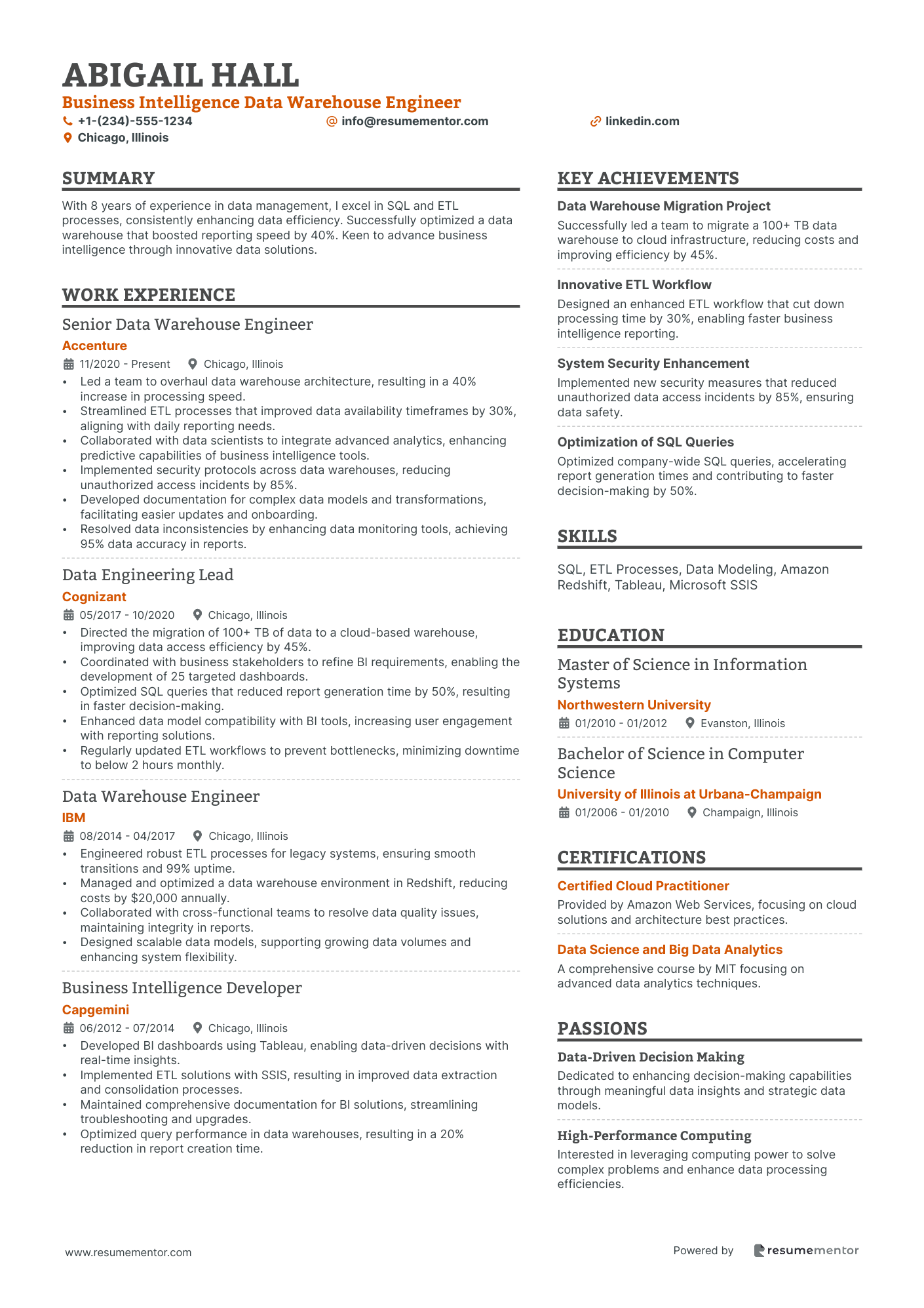
Business Intelligence Data Warehouse Engineer
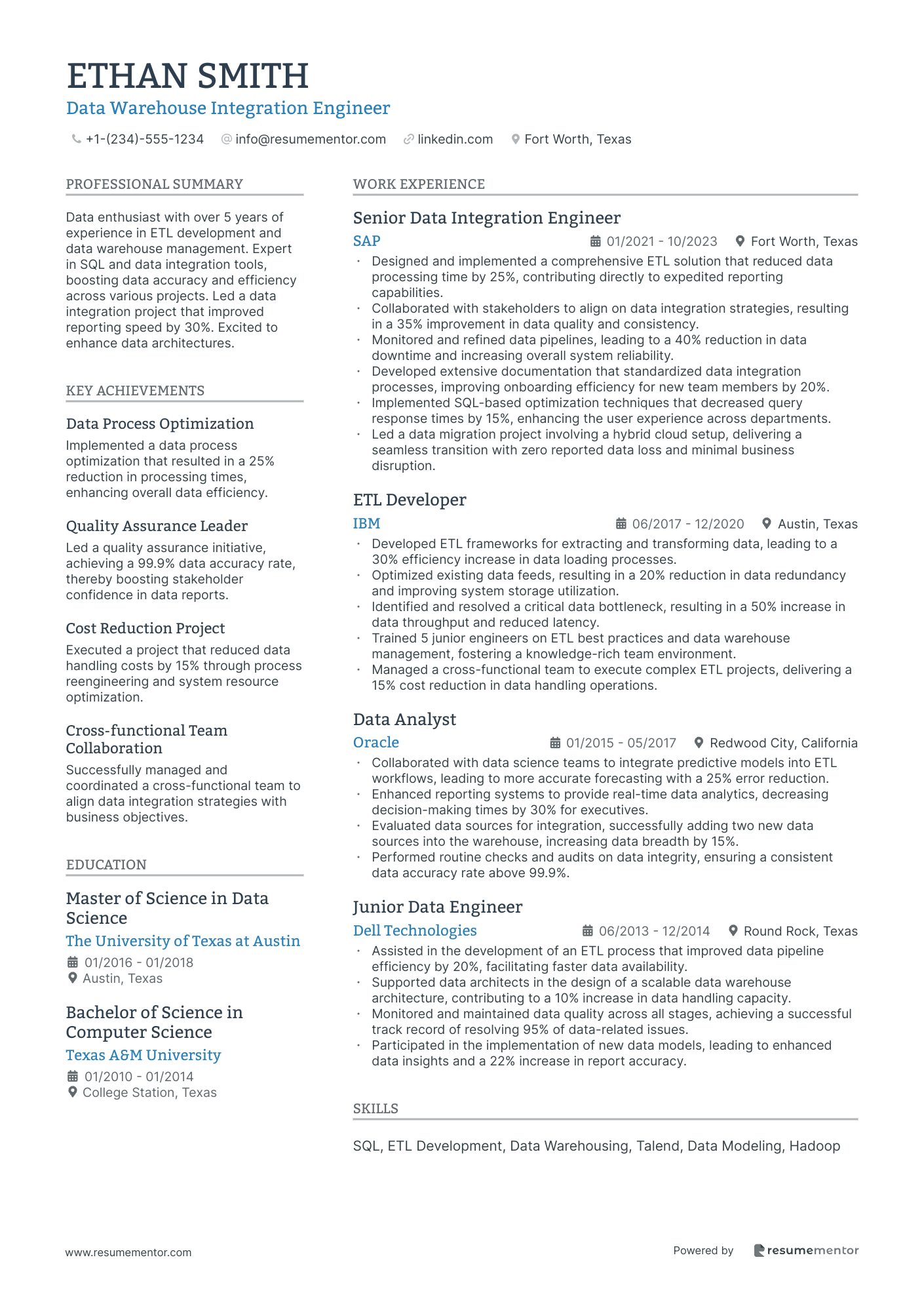
Data Warehouse Integration Engineer

Data Warehouse Development Engineer resume sample
- •Led a team to design and implement ETL processes, which increased data processing efficiency by 25%.
- •Conducted data quality audits improving the accuracy of business intelligence reports by 30%.
- •Collaborated with cross-functional teams resulting in enhanced data models supporting 50+ active dashboards.
- •Utilized Snowflake to integrate big data solutions resulting in a 40% cost reduction.
- •Optimized existing ETL workflows, resulting in a processing time reduction from 4 hours to 2 hours.
- •Documented and maintained architecture for seamless integration with emerging data technologies.
- •Designed data pipelines for integrating diverse data sources increasing overall data accessibility by 35%.
- •Developed ETL solutions using Informatica that handled daily transactions exceeding 1 million records.
- •Implemented scaling strategies for data storage solutions providing a 20% increase in data retrieval speed.
- •Reduced data redundancy through refined data models, achieving an 18% reduction in storage costs.
- •Contributed to the migration of on-premise systems to AWS Redshift, ensuring zero data loss.
- •Collaborated with stakeholders to gather requirements and translate them into technical specifications.
- •Enhanced data integration processes, reducing data integration errors by 40%.
- •Utilized SQL Server for managing complex business queries, enhancing reporting capabilities by 50%.
- •Improved existing ETL frameworks, speeding up processing tasks by 30%.
- •Prepared and managed data models for streamlined business analytics, increasing analytical efficiency by 25%.
- •Conducted thorough data quality checks ensuring data reliability with a decrease in error rates by 35%.
- •Assisted in the maintenance of data architecture, supporting an ever-growing data warehouse environment.
- •Developed and maintained extensive data warehouse documentation, improving team productivity by 20%.
Big Data Warehouse Specialist resume sample
- •Led a team to implement a big data warehouse solution, reducing data processing time by 25% through optimized ETL processes.
- •Collaborated with cross-functional teams to develop advanced data models, aligning them with corporate business objectives for increased data accuracy.
- •Improved data ingestion frameworks leading to a 30% increase in data processing speeds using Kafka and Apache Spark.
- •Monitored and resolved data warehouse performance bottlenecks, enhancing scalability and reliability which improved system uptime by 15%.
- •Maintained data integrity and compliance with industry standards, resulting in a 40% enhancement in data security protocols.
- •Supported data analysts with strategic insights by structuring complex datasets, contributing to a 20% increase in data-driven decision-making efficiency.
- •Executed the design and implementation of data extraction solutions, increasing data flow efficiency by 20% for analytics processes.
- •Optimized ETL pipelines resulting in lower operational costs by 15%, leveraging cloud-based solutions on AWS.
- •Conducted comprehensive analyses of data models and databases, delivering insights that increased business intelligence accuracy by 30%.
- •Streamlined data transformation processes using Python and Scala, improving processing reliability and reducing error rates by 25%.
- •Maintained a secure and compliant data environment by adhering to best practices, enhancing data protection measures by 20%.
- •Developed data models to support analytics teams, improving metrics accuracy by 15% and refining customer segmentation strategies.
- •Analyzed large datasets to generate actionable insights that boosted sales strategies by 10%, delivering meaningful business value.
- •Automated data pipeline workflows, enhancing data processing efficiency by 18% and reducing manual intervention.
- •Worked directly with stakeholders to gather and refine data requirements, enhancing report reliability and decision-making processes.
- •Assisted in the development of scalable ETL frameworks, optimizing data extraction processes and increasing data throughput by 5%.
- •Supported the architecture of big data solutions, contributing to the development of a robust data environment.
- •Monitored and maintained data security practices, ensuring compliance and minimizing data breaches by adhering to industry standards.
- •Collaborated with senior engineers on troubleshooting projects, learning advanced data processing techniques and improving workflow efficiencies.
SQL Data Warehouse Engineer resume sample
- •Designed and implemented a data warehouse solution for business intelligence that improved query performance by 30%.
- •Developed complex SQL queries that reduced data retrieval times by 25%, enhancing overall efficiency of the data analytics team.
- •Collaborated with stakeholders to understand requirements, delivering accurate technical specifications and achieving a 95% satisfaction rating.
- •Optimized ETL processes, resulting in a 40% faster data processing time and improved operational efficiency.
- •Implemented data quality control measures, decreasing data errors by 15% and ensuring high standards of data integrity.
- •Led code reviews, providing feedback that resulted in a 20% reduction in errors and enhancing team productivity.
- •Managed the development of ETL processes, enhancing data integration and reducing redundant data by 20%.
- •Streamlined SQL scripts, improving system performance and lowering query execution time by 35%.
- •Conducted troubleshooting and resolved data processing issues, achieving a 90% resolution rate within 24 hours.
- •Maintained documentation of warehouse procedures, improving team onboarding efficiency by 15%.
- •Enhanced database functionality by integrating cloud-based solutions, leading to a scalable and flexible data environment.
- •Designed and maintained ETL processes that increased data load efficiency by 25% and supported business intelligence operations.
- •Worked closely with analysts to develop data models that aligned with business requirements, enhancing reporting accuracy.
- •Implemented data governance policies, leading to a 10% improvement in data consistency and reliability.
- •Participated in data warehouse migration projects, contributing to a seamless transition and minimizing downtime.
- •Assisted in the design of data warehouse architectures that improved data handling by 20% and supported analytical efforts.
- •Executed data validation scripts that increased data accuracy and integrity, resulting in a 98% data accuracy rate.
- •Collaborated with IT teams to integrate new technologies, enhancing system capabilities and ensuring data security.
- •Conducted performance tuning of SQL queries, boosting overall database responsiveness and efficiency.
ETL Data Warehouse Engineer resume sample
- •Designed and implemented ETL processes for a financial data warehouse, resulting in a 40% improvement in data processing speeds.
- •Collaborated with data scientists to enhance data-driven decision-making, increasing operational efficiency by 25%.
- •Developed data models and workflows that supported a new product line, lowering customer onboarding time by 15%.
- •Optimized ETL jobs using Apache Nifi, improving scalability and reducing costs by 20%.
- •Monitored ETL processes for data quality issues, resulting in a 30% improvement in data accuracy.
- •Participated in code reviews to enhance ETL best practices, reducing code-related issues by 45%.
- •Managed ETL tool migrations to AWS cloud platform, achieving increased reliability and system uptime by 99.9%.
- •Performed ETL process optimizations, enhancing data retrieval times by 50% for the marketing team.
- •Produced comprehensive data flow documentation, supporting data governance compliance and reducing audit times by 35%.
- •Worked directly with stakeholders to capture requirements, improving data alignment with business objectives by 30%.
- •Maintained metadata documentation leading to a decrease in onboarding time for new team members by 50%.
- •Implemented ETL processes with Informatica for CRM data, boosting sales data integration efficiency by 60%.
- •Reduced ETL job runtimes by 40% through advanced SQL optimizations and ETL tool upgrades.
- •Collaborated with cross-functional teams to establish new data quality metrics, improving reporting accuracy by 20%.
- •Ensured data security compliance, decreasing data-related incidents by 25% in 12 months.
- •Supported the development of a customer analytics warehouse, enhancing user insights and improving marketing ROI by 35%.
- •Managed daily ETL process operations, maintaining 99.8% operational efficiency on core data systems.
- •Improved ETL job error resolution times by 70% through implementation of automated alert systems.
- •Worked on SQL database enhancements, resulting in improved query execution times by 30%.
Cloud Data Warehouse Engineer resume sample
- •Led a team to architect and deploy scalable cloud data warehouse solutions, reducing processing time by 30%.
- •Designed ETL processes, improving data ingestion efficiency by 50%, enhancing data reporting insights.
- •Collaborated with cross-functional teams to establish data requirements, boosting stakeholder satisfaction by 20%.
- •Implemented database design for optimal performance, resulting in a 15% increase in query response speed.
- •Optimized data warehouse operations, achieving a 25% reduction in operational costs year over year.
- •Drafted comprehensive documentation of data warehouse architecture and methodologies for knowledge sharing.
- •Developed scalable cloud-based data solutions, driving a 40% increase in data handling capacity.
- •Engineered custom ETL pipelines to streamline data integration, enhancing data quality by 35%.
- •Spearheaded data modeling projects, improving database performance by 20% through efficient design.
- •Automated monitoring procedures, decreasing data issue resolution time from weeks to days.
- •Ensured up-to-date documentation of data processes, facilitating team collaboration and efficiency.
- •Executed design of data warehouse solutions on cloud platforms, enhancing storage efficiency by 25%.
- •Developed robust ETL processes, minimizing data loading times by 30% across departments.
- •Collaborated closely with data analysts to address business needs, resulting in improved data use cases.
- •Guided data platform upgrades, ensuring systems are future-ready, reducing downtime by 20%.
- •Assessed existing data warehouse systems and recommended enhancements, increasing performance by 15%.
- •Contributed to cross-functional projects leveraging cloud data storage, improving data accessibility.
- •Analyzed data modeling techniques, implementing strategies that improved data integrity by 25%.
- •Assisted in resolving complex data warehouse issues, providing solutions that streamlined operations.
Data Warehouse Infrastructure Engineer resume sample
- •Designed and deployed a scalable data warehouse architecture on Google BigQuery, improving query performance by 30% and data processing efficiency by 25%.
- •Collaborated with cross-functional teams to integrate data sources, improving data accuracy and decision-making speed by 15%.
- •Optimized ETL processes, reducing data ingestion time by 50%, resulting in more timely access to data insights.
- •Implemented robust data governance protocols, achieving 100% compliance with industry regulations and enhancing data security.
- •Led a team of engineers to troubleshoot and resolve data warehouse issues, ensuring 99.9% uptime and seamless operations.
- •Documented warehouse architecture and processes, facilitating new team members' onboarding and enhancing knowledge sharing across teams.
- •Developed cloud-based ETL pipelines on AWS Redshift, increasing data processing speed by 40% with improved resource allocation.
- •Assisted data analysts in translating business requirements into technical solutions, resulting in customized, user-focused data tools.
- •Monitored cloud-based data environment, proactively identifying and resolving bottlenecks to maintain optimal system performance.
- •Automated complex data integration processes using Python, streamlining workflows and reducing manual workload by over 60%.
- •Enhanced data security measures, implementing encryption standards and reducing potential vulnerabilities by 20%.
- •Managed development of ETL procedures and data warehouse design, directly contributing to increased data integration capacity by 35%.
- •Collaborated in a team to implement data modeling strategies that improved data accessibility and efficiency for end-users.
- •Conducted performance tuning of ETL processes, resulting in a significant reduction of processing times by 45%.
- •Introduced process automation through scripting, allowing for more efficient system monitoring and faster incident resolution.
- •Oversaw daily operations of the enterprise database, ensuring 99.5% system uptime and reliability for end-users.
- •Implemented database schema changes to support evolving business needs, enhancing data retrieval and usability by 20%.
- •Provided comprehensive support and maintenance for high-performing database systems, minimizing downtime and optimizing resources.
- •Collaborated with IT and development teams to address data storage needs, effectively increasing storage efficiency by 15%.
SAP Data Warehouse Engineer resume sample
- •Designed comprehensive SAP BW/4HANA solutions, reducing query execution time by 20% and improving system responsiveness.
- •Collaborated with cross-functional teams to implement business-oriented data solutions, enhancing report generation efficiency by 35%.
- •Developed robust ETL pipelines, ensuring a 99.5% data accuracy rate across multiple source systems for key stakeholders.
- •Optimized data models, enhancing scalability and reducing data retrieval time by up to 30% within large datasets.
- •Actively monitored and maintained high availability of warehouse systems, achieving a 99% uptime consistently.
- •Pioneered the transition to cloud-based SAP Analytics Cloud solutions, resulting in a 25% increase in data processing speed.
- •Developed and managed ETL processes that handled over 10 million daily data points with a 98% accuracy rate.
- •Played key role in upgrading SAP BW systems, which improved data retrieval times by 40% and streamlined reporting capabilities.
- •Liaised with business stakeholders to align data architecture with strategic goals, enhancing decision-making efficiency by 22%.
- •Conducted thorough data quality assessments, identifying integrity issues and reducing incidence by 18% through targeted interventions.
- •Supported BI developers in creating insightful dashboards, driving a 15% increase in user engagement across departments.
- •Streamlined data profiling processes, decreasing evaluation time by 25% and bolstering the system's reliability.
- •Implemented data governance protocols, ensuring compliance with industry standards and contributing to a 10% reduction in risks.
- •Designed conceptual and logical data models, boosting report generation speed by 15% for cross-functional teams.
- •Facilitated knowledge transfer sessions, promoting best practices in SAP BW and increasing team efficiency by 12%.
- •Analyzed complex datasets to derive actionable insights, enhancing project delivery timelines by 20%.
- •Collaborated with data engineers to optimize data extraction processes, improving workflow consistency by 15%.
- •Managed data quality control activities, leading to a substantial 95% accuracy rate in client reporting.
- •Conducted regular system checks and troubleshooting, maintaining a 98% system uptime, thus improving service reliability.
Business Intelligence Data Warehouse Engineer resume sample
- •Led a team to overhaul data warehouse architecture, resulting in a 40% increase in processing speed.
- •Streamlined ETL processes that improved data availability timeframes by 30%, aligning with daily reporting needs.
- •Collaborated with data scientists to integrate advanced analytics, enhancing predictive capabilities of business intelligence tools.
- •Implemented security protocols across data warehouses, reducing unauthorized access incidents by 85%.
- •Developed documentation for complex data models and transformations, facilitating easier updates and onboarding.
- •Resolved data inconsistencies by enhancing data monitoring tools, achieving 95% data accuracy in reports.
- •Directed the migration of 100+ TB of data to a cloud-based warehouse, improving data access efficiency by 45%.
- •Coordinated with business stakeholders to refine BI requirements, enabling the development of 25 targeted dashboards.
- •Optimized SQL queries that reduced report generation time by 50%, resulting in faster decision-making.
- •Enhanced data model compatibility with BI tools, increasing user engagement with reporting solutions.
- •Regularly updated ETL workflows to prevent bottlenecks, minimizing downtime to below 2 hours monthly.
- •Engineered robust ETL processes for legacy systems, ensuring smooth transitions and 99% uptime.
- •Managed and optimized a data warehouse environment in Redshift, reducing costs by $20,000 annually.
- •Collaborated with cross-functional teams to resolve data quality issues, maintaining integrity in reports.
- •Designed scalable data models, supporting growing data volumes and enhancing system flexibility.
- •Developed BI dashboards using Tableau, enabling data-driven decisions with real-time insights.
- •Implemented ETL solutions with SSIS, resulting in improved data extraction and consolidation processes.
- •Maintained comprehensive documentation for BI solutions, streamlining troubleshooting and upgrades.
- •Optimized query performance in data warehouses, resulting in a 20% reduction in report creation time.
Data Warehouse Integration Engineer resume sample
- •Designed and implemented a comprehensive ETL solution that reduced data processing time by 25%, contributing directly to expedited reporting capabilities.
- •Collaborated with stakeholders to align on data integration strategies, resulting in a 35% improvement in data quality and consistency.
- •Monitored and refined data pipelines, leading to a 40% reduction in data downtime and increasing overall system reliability.
- •Developed extensive documentation that standardized data integration processes, improving onboarding efficiency for new team members by 20%.
- •Implemented SQL-based optimization techniques that decreased query response times by 15%, enhancing the user experience across departments.
- •Led a data migration project involving a hybrid cloud setup, delivering a seamless transition with zero reported data loss and minimal business disruption.
- •Developed ETL frameworks for extracting and transforming data, leading to a 30% efficiency increase in data loading processes.
- •Optimized existing data feeds, resulting in a 20% reduction in data redundancy and improving system storage utilization.
- •Identified and resolved a critical data bottleneck, resulting in a 50% increase in data throughput and reduced latency.
- •Trained 5 junior engineers on ETL best practices and data warehouse management, fostering a knowledge-rich team environment.
- •Managed a cross-functional team to execute complex ETL projects, delivering a 15% cost reduction in data handling operations.
- •Collaborated with data science teams to integrate predictive models into ETL workflows, leading to more accurate forecasting with a 25% error reduction.
- •Enhanced reporting systems to provide real-time data analytics, decreasing decision-making times by 30% for executives.
- •Evaluated data sources for integration, successfully adding two new data sources into the warehouse, increasing data breadth by 15%.
- •Performed routine checks and audits on data integrity, ensuring a consistent data accuracy rate above 99.9%.
- •Assisted in the development of an ETL process that improved data pipeline efficiency by 20%, facilitating faster data availability.
- •Supported data architects in the design of a scalable data warehouse architecture, contributing to a 10% increase in data handling capacity.
- •Monitored and maintained data quality across all stages, achieving a successful track record of resolving 95% of data-related issues.
- •Participated in the implementation of new data models, leading to enhanced data insights and a 22% increase in report accuracy.
Crafting a resume as a data warehouse engineer can feel like designing a seamless data model. While you're skilled at managing information and ensuring accuracy, effectively translating those abilities onto paper is another challenge. In today’s job market, balancing your technical prowess with what hiring managers want to see is vital.
Your expertise in data warehousing is essential, covering everything from ETL processes to database management. Presenting these skills in an impactful way, however, requires more than just a list. This is where a structured approach, like using a resume template, becomes invaluable. By leveraging a well-organized template, you can effectively highlight your experience and skills. Explore these resume templates to find one that showcases your strengths and sets you apart.
Employers are seeking clear communication, problem-solving abilities, and relevant experience. As you start working on your resume, keep clarity and relevance in mind. Focus on achievements that display your impact in previous roles and tailor your resume to highlight what makes you unique as a data warehouse engineer. With the right template and attention to your unique contributions, you'll create a resume that opens doors to exciting new opportunities.
Key Takeaways
- Creating an impactful data warehouse engineer resume involves balancing technical prowess with clear communication and relevance to hiring managers' expectations.
- A well-structured resume should include a professional summary, a detailed account of technical skills, and a clear presentation of work experience, education, and significant projects.
- The resume format should be reverse chronological, focus on using a clean layout with modern fonts, and should be saved as a PDF to maintain consistency.
- Quantifying accomplishments in the experience section by using numbers and specific achievements helps in demonstrating tangible impacts and effectiveness.
- Highlighting both hard skills, like data modeling and ETL processes, and soft skills, such as problem-solving and communication, is essential to present a comprehensive skill set tailored to the job requirements.
What to focus on when writing your data warehouse engineer resume
Your data warehouse engineer resume should effectively communicate your ability to design and manage data systems. It's important to convey your capability to handle large datasets and solve complex problems to optimize data architecture. Make sure to emphasize your experience with data warehousing technologies, along with your coding skills and proven track record in improving system performance.
How to structure your data warehouse engineer resume
- Contact Information: Start with your full name, phone number, and professional email, alongside your LinkedIn profile. Keeping these details current and professional is crucial as they form your first impression— a polished contact section sets the stage for a resume that's easy to connect with.
- Professional Summary: Provide a snapshot of your experience in data warehousing, detailing your technical skills. This is where to highlight familiarity with tools like SQL, ETL processes, and BI solutions. Show how these skills have been crucial in your ability to deliver results—this summary acts as a roadmap for your resume, emphasizing key themes.
- Technical Skills: Follow with a list of skills such as database management, ETL processes, and data modeling. Specify platforms you're proficient with, like Amazon Redshift or Google BigQuery, which reinforces your ability to manage data efficiently—this section will capture the recruiter’s interest with your specific expertise.
- Work Experience: Your work history should clearly outline your roles, supported by job titles, company names, and dates. Use bullet points to showcase achievements and specify the technologies or tools, such as SQL or Python, you frequently employed. This demonstrates your hands-on experience—showcasing accomplishments provides tangible proof of your expertise.
- Education: Alongside your degree(s), include any relevant certifications, further illustrating your commitment to the field. Mention courses or projects related to data engineering to show continued learning. This educational background rounds out your technical narrative—leading into your practical projects.
- Projects: Highlight significant projects where you developed or optimized data warehouses. Detailing outcomes, like performance improvements or cost reductions, underscores the tangible impact of your contributions. Providing this project context elevates your resume by showing results—up next, we'll delve into each section to format your resume effectively.
Which resume format to choose
Your resume as a data warehouse engineer should reflect professionalism and clarity, and the format you choose is key to achieving that. A reverse-chronological format works best for your field because it allows you to clearly display your technical expertise and career development, with your most recent and relevant experiences at the forefront. This layout meets employer expectations and helps highlight your growth within the fast-evolving tech industry.
To enhance the overall presentation, select clean and modern fonts. Consider Raleway for its straightforward lines, Montserrat to add a contemporary feel, or Lato for an approachable and clean aesthetic. These fonts provide a fresh look that complements the technological nature of your work without distracting from the content.
It's crucial to save your resume as a PDF. This file type preserves your formatting and layout regardless of the device or software being used, ensuring that your document remains consistent and professional when viewed by hiring managers or recruiters.
Maintaining one-inch margins on all sides contributes to the resume’s readability and visual appeal. Adequate white space keeps the document uncluttered, making it easy for readers to focus on your skills and accomplishments, essential for catching the attention of busy hiring professionals.
By integrating these elements, your resume will effectively present your skills and experience with clarity and style, helping you stand out in the competitive field of data warehousing.
How to write a quantifiable resume experience section
Sure, let's create a more cohesive flow:
The experience section of your data warehouse engineer resume is crucial as it directly connects your skills and achievements to the needs of potential employers. By focusing on specific accomplishments, you can demonstrate the real impact you've made. Starting with your most recent position and working backward, this reverse chronological order helps recruiters quickly grasp your latest successes and overall career growth. Typically, you should include the last 10-15 years of experience unless earlier work is particularly relevant to the role. Tailoring this section for each job application is key; align your experience with the keywords and skills found in the job description. By using strong action words like "optimized," "designed," "implemented," and "led," you can effectively highlight your contributions. Ultimately, quantifying your accomplishments with numbers adds credibility and paints a clear picture of your impact.
- •Architected and deployed a scalable data warehouse solution, cutting query time by 40% and boosting data retrieval speed.
- •Spearheaded new ETL processes that increased data accuracy by 25% using cutting-edge technology.
- •Managed a team of 5 engineers, completing a major project three months early and enhancing company products.
- •Implemented advanced data modeling techniques, achieving a 50% improvement in system efficiency and user satisfaction.
This experience section seamlessly integrates your technical skills and achievements, showcasing how your work directly benefits the organization. By using action-oriented language and providing quantitative measures of success, such as cutting query time and boosting data retrieval speed, the section paints a vivid picture of your impact. The bullet points make the content easy to digest, while focusing on accomplishments like enhanced data accuracy and efficiency connects directly to key expectations of a data warehouse engineer. The targeted use of industry-specific language and metrics makes your capabilities and contributions unmistakably clear, aligning perfectly with what hiring managers are looking for.
Collaboration-Focused resume experience section
A collaboration-focused data warehouse engineer resume experience section should highlight your ability to work effectively with others and your role in successful teamwork. Start by detailing specific projects where your collaborative skills made a significant impact. Explain how you contributed to your team’s success and helped improve workflows through strategic communication. Incorporating examples of cross-departmental work can also demonstrate your capability to connect different areas such as data analysis, IT, and business strategy into a cohesive team effort.
Using bullet points, present your experience in a clear and structured way that makes your contributions easy to understand. Begin each bullet with an action verb to emphasize your active involvement. Highlight any tools or methodologies that benefited from your teamwork and detail the positive outcomes achieved. Ensure your bullets show how your collaboration skills led to completing projects successfully, boosting efficiency, or bringing about innovations. This approach makes your resume stand out by focusing on your team-driven achievements, showcasing you as a vital contributor to any organization.
Data Warehouse Engineer
Tech Solutions Inc
March 2018 - June 2022
- Collaborated with IT and business teams to design a scalable data warehouse architecture.
- Facilitated weekly meetings with stakeholders to ensure seamless data integration and aligned goals.
- Worked with cross-functional teams to reduce data processing time by 30%.
- Developed team-based training sessions to enhance skills in SQL and ETL tools.
Growth-Focused resume experience section
A growth-focused data warehouse engineer resume experience section should clearly demonstrate your role in driving scalability and innovation. Begin by highlighting results such as increased efficiency, cost savings, or enhanced performance, and use specific numbers to illustrate the impact of your work. Connect this to the methodologies or technologies you've implemented, emphasizing how these initiatives contributed to company growth.
Be explicit about your responsibilities in previous roles, focusing on outcomes and how your efforts supported business success. Use dynamic action verbs to vividly convey your achievements while aligning your experience with the company's objectives. By doing so, you not only spotlight your skills but also illustrate your potential to foster growth and development within an organization.
Data Warehouse Engineer
Tech Innovators Inc.
Jan 2020 - Sep 2023
- Improved data processing speed by 25%, enabling quicker access to insights.
- Implemented new ETL tools, reducing data inaccuracies by 15% and enhancing data reliability.
- Collaborated across departments to develop reporting capabilities, boosting decision-making processes.
- Led a team of four engineers to redesign data architecture, supporting a 50% increase in storage capacity.
Result-Focused resume experience section
A result-focused data warehouse engineer resume experience section should center on showcasing your achievements and the tangible improvements you've driven in your roles. Begin by summarizing your responsibilities and the scope of projects you led or contributed to, highlighting how these efforts improved overall performance. Follow this with bullet points that illustrate key accomplishments, using numbers or percentages to underline the impact of your work. This approach ensures potential employers quickly understand the value you’ve brought to previous positions.
Detail your experience with an emphasis on clarity and continuity, linking your actions to specific outcomes like enhanced processes, improved data management, or cost savings. Use simple language to maintain readability while highlighting your technical expertise and the benefits you've delivered. By seamlessly connecting these elements, your resume will present a cohesive story of success and capability in managing complex data environments.
Data Warehouse Engineer
Tech Innovators Inc.
June 2019 - May 2022
- Led a team to revamp the company’s data warehouse, resulting in a 40% increase in query performance.
- Implemented data quality testing protocols, reducing errors by 25% and ensuring more reliable data.
- Streamlined ETL processes, cutting loading time by 30% and enhancing overall efficiency and resource allocation.
- Collaborated with cross-functional teams to create a real-time data analytics platform, which boosted decision-making speed by 50%.
Skills-Focused resume experience section
A skills-focused data warehouse engineer resume experience section should clearly display the talents that set you apart. Begin by identifying the essential skills for the role, such as data modeling, ETL development, SQL proficiency, and problem-solving. Once you've outlined these, craft your resume to highlight experiences where these skills truly shined. By using specific examples, you can effectively show how your contributions positively impacted your workplace.
Adding quantifiable achievements can further enhance your resume. For instance, instead of merely stating that you "improved database performance," you might say "boosted database performance by 20% through optimizing queries and indexing." This provides tangible evidence of your capabilities. Ensuring your format is clear and easy to read with bullet points will make the information accessible. By focusing on the skills that are most relevant to the job, you position yourself to stand out and clearly demonstrate your qualifications.
Data Warehouse Engineer
Tech Solutions Inc.
June 2019 - Present
- Designed and implemented a new data warehouse architecture that improved query performance by 25%
- Developed ETL processes that reduced data load time from 4 hours to 30 minutes
- Collaborated with BI team to create dashboards, improving business insights for marketing
- Trained junior team members, enhancing team efficiency by 15%
Write your data warehouse engineer resume summary section
A data-focused data warehouse engineer resume experience section should effectively capture your skills, experience, and unique contributions to a team. This section is powerful, particularly if you have several years in the field, as it can highlight your technical achievements and how you've driven success. Focus on mentioning specific tools and technologies that are key to the role. For example:
This example pulls together your expertise and achievements, with measurable results like reducing data processing time by 30%. Your tone should convey confidence and convey your readiness to contribute positively. While summaries are ideal for experienced professionals, an objective is more suited to entry-level roles where your goals and aspirations take center stage. A resume profile broadens this approach by highlighting major career milestones and skills. In contrast, a summary of qualifications lists critical competencies directly related to the job. Understanding these formats helps tailor your resume to your career stage and effectively showcases your most pertinent qualities.
Listing your data warehouse engineer skills on your resume
A skills-focused data warehouse engineer resume should effectively showcase both technical abilities and interpersonal strengths. You have the option to create a standalone section dedicated to your skills or blend them seamlessly into your experience and summary. This approach enriches your profile and paints a clearer picture for potential employers.
It’s important to highlight both your technical prowess and your soft skills. Hard skills, such as your expertise in specific software or data warehousing systems, underline your capability to handle tasks that require specialized technical knowledge.
Skills and strengths act as keywords in your resume, guiding applicant tracking systems and attracting the attention of hiring managers. These keywords align your qualifications with what employers are actively searching for.
Consider this example of a standalone skills section formatted in JSON:
What makes this skills list effective is its clarity and relevance. It provides hiring managers a straightforward view of your capabilities, helping them quickly see your fit for the role.
Best hard skills to feature on your data warehouse engineer resume
Highlighting hard skills displays your technical capacity to handle data systems in your role. Skills like data modeling and ETL processes demonstrate your ability to design, manage, and optimize data frameworks. Essential hard skills include:
Hard Skills
- Data Modeling
- ETL (Extract, Transform, Load) Processes
- SQL Programming
- Data Warehousing Solutions
- Performance Tuning
- Big Data Technologies
- Data Integration
- Data Migration
- Cloud Data Solutions
- Database Management
- Data Security
- Data Quality Management
- Programming Languages (Python/Java)
- Shell Scripting
- Query Optimization
Best soft skills to feature on your data warehouse engineer resume
Soft skills speak to your interpersonal abilities and problem-solving skills. They show employers your capability to work collaboratively and adapt to various challenges. Key soft skills to emphasize include:
Soft Skills
- Analytical Thinking
- Attention to Detail
- Problem-Solving
- Communication Skills
- Teamwork
- Time Management
- Adaptability
- Critical Thinking
- Project Management
- Leadership
- Multitasking
- Patience
- Organizational Skills
- Creative Thinking
- Decision-Making Skills
How to include your education on your resume
An education section is an essential part of your data warehouse engineer resume. It allows potential employers to quickly evaluate your academic qualifications. Tailor your education section to the specific requirements of the job. Only include education that is relevant to the role you are applying for. When deciding whether to include your GPA, consider if it enhances your candidacy; a GPA of 3.5 or higher generally strengthens your application. If you graduated with honors, such as cum laude, make sure to highlight it as it adds value. Clearly list your degree, along with the institution and dates attended.
The second example stands out because it showcases a relevant degree in Computer Science, which aligns with a data warehouse engineer position. Including a GPA of 3.8 indicates strong academic performance, making the candidate more appealing to employers. The clear, concise presentation of the education details ensures easy readability and comprehension. Tailoring the section to the role demonstrates that the applicant thoughtfully targets their resume to the job. This approach reflects well on your attention to detail and understanding of the industry.
How to include data warehouse engineer certificates on your resume
Including a certificate section in your data warehouse engineer resume is essential. Certificates show that you have technical skills and knowledge. They enhance your qualifications and set you apart from other candidates. You can also include your certificates in the header for instant visibility.
List the name of the certificate first. Include the date you earned it. Add the issuing organization for context. Ensure the certificates are relevant to the job.
For example:
This example is good because it highlights relevant certifications. They are issued by well-known organizations in the tech industry. The inclusion of both title and issuer adds credibility. These certificates show specialized skills in data engineering. They also signal a commitment to continuous learning.
Extra sections to include in your data warehouse engineer resume
Crafting a resume for a data warehouse engineer is more than just listing your technical skills and job experience. Including sections like language, hobbies and interests, volunteer work, and books can provide a robust snapshot of your personality and uniqueness, helping you stand out among other candidates.
Language section — List any languages you speak fluently. Show your ability to work with diverse teams or customers.
Hobbies and interests section — Highlight hobbies that demonstrate problem-solving skills or attention to detail. This can make you relatable and exhibit your well-rounded character.
Volunteer work section — Showcase your volunteer experiences. Emphasize your willingness to contribute to the community and your leadership skills.
Books section — Mention books you’ve read related to data science or personal development. Reflect your continuous learning attitude and intellectual curiosity.
Presenting these additional sections can help humanize your resume, making you more memorable and distinctive to potential employers.
In Conclusion
In conclusion, creating a resume that stands out from the crowd requires more than just listing your technical skills. As a data warehouse engineer, your challenge is to effectively communicate the blend of technical prowess and strategic thinking that you bring to the table. Utilizing a reverse-chronological format can help highlight your most recent and relevant experiences, which is particularly beneficial in the fast-paced tech industry. Taking the time to tailor your resume with quantifiable accomplishments ensures that you clearly demonstrate the impact of your work.
It's important to remember that your resume is a reflection of both your technical and interpersonal skills. Hiring managers are looking for candidates who are not only technically capable but also possess soft skills such as teamwork and communication. Including these skills in a structured and concise manner, along with relevant certifications, can greatly enhance your appeal.
By using clear and modern fonts, maintaining adequate margins, and saving your document as a PDF, you preserve the professionalism and clarity of your resume. Consider adding extra sections such as volunteer work or hobbies to showcase your well-rounded personality, making you more relatable to potential employers.
Ultimately, a well-crafted resume that includes a balance of technical achievements and personal attributes can open doors to exciting career opportunities. Tailoring your resume to each job application shows your attention to detail and commitment to the field of data warehousing. By focusing on both your hard and soft skills, and presenting them in a visually appealing format, you position yourself as a strong candidate in the competitive job market.
Related Articles

Continue Reading
Check more recommended readings to get the job of your dreams.
Resume
Resources
Tools
© 2026. All rights reserved.
Made with love by people who care.

